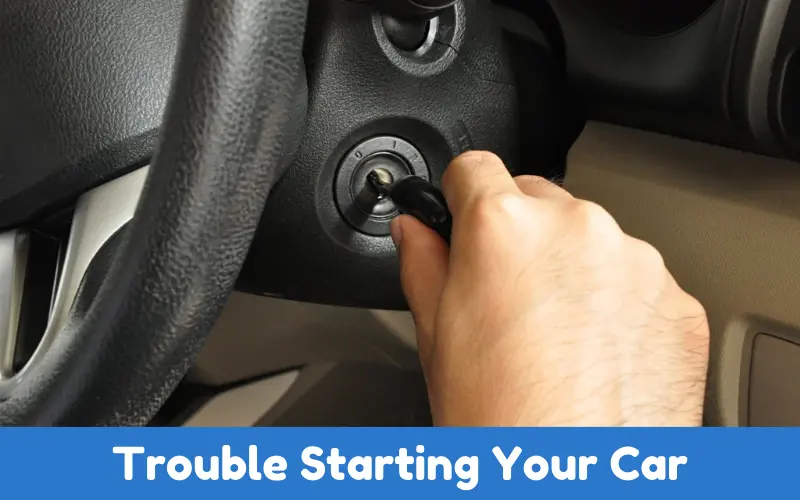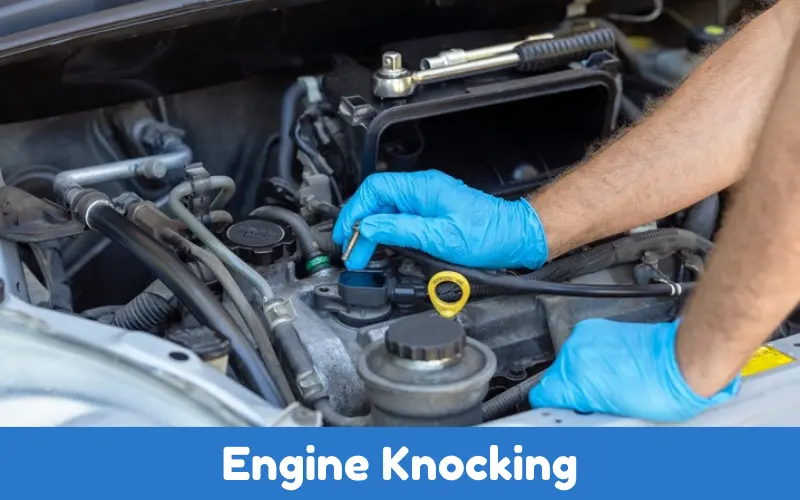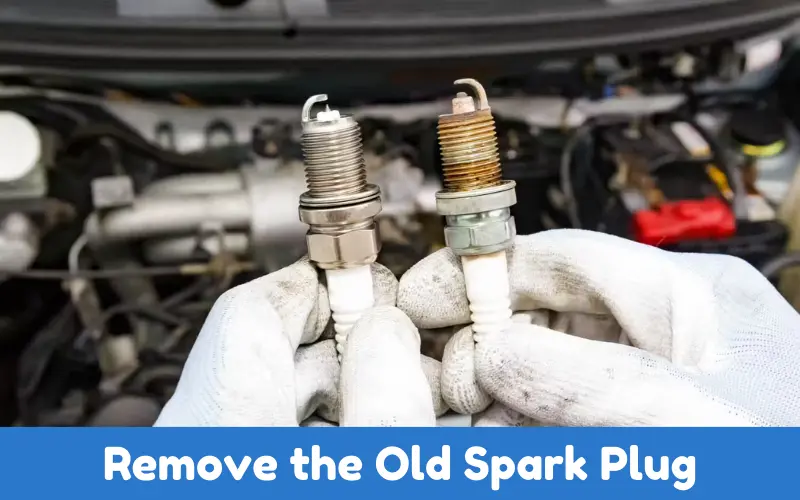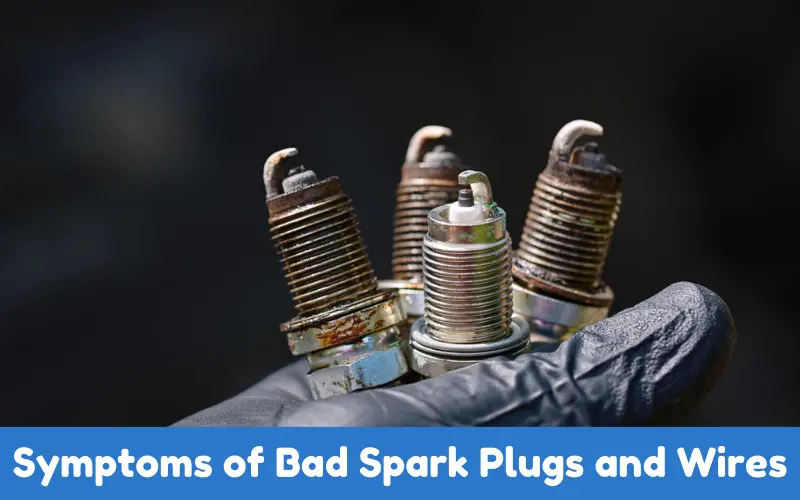Spark plugs and wires are vital to your car’s engine performance because they ignite the fuel air mixture that fuels combustion.
Eventually, they get worn out and begin to cause symptoms. You can feel like your car doesn’t run right any more.
If you catch the symptoms of bad spark plugs and wires early, you may be able to stop more expensive engine issues before they start.
In this guide, we’ll talk about the common symptoms and why early replacement is important.
Topic Summary
Major Symptoms of Bad Spark Plugs and Wires
Basically, your car would not operate without its spark plugs and wires. They eventually get worn out and can affect the performance of your car engine.
However, there are some signs that your car will give away to let you know whether it has bad spark plugs and wires. These are:
1. Engine Misfires
One of the most common shortcomings of spark plugs or spark plug wires is a symptom called ‘engine misfiring’ (because some cylinders are not fully firing).
If your engine sounds or ‘jumps’ when you accelerate, for example, you might have a misfire caused by a plug that’s not firing a cylinder correctly. In doing so, it can cause poor fuel mileage and performance.
2. Rough Idling
If your engine is running ragged at idle speed, your first stop should be at the spark plugs. By definition, worn-out spark plugs can’t ignite a fuel air mixture (which is a good reason not to ignore a misfire at idle), so your engine is, at best, idling a bit irregularly, if not sputtering every few seconds.
3. Trouble Starting Your Car
Indications of this sort of problem include starting your car, especially in cold weather. The spark plugs produce the initial electrical impulse that gets an engine started, and worn plugs will leave the engine hesitant to start or not at all.

Failing spark plug wires might also present themselves in this way by not transferring enough power to the plugs.
4. Poor Fuel Economy
Bad spark plugs and wire, meanwhile, are a surefire sign of a loss of fuel economy. The combustion process won’t fire properly, causing your engine to work harder and use more fuel. If you’ve had a gallon (MPG) lately, it’s time to have your spark plugs looked at and replaced.
5. Reduced Acceleration
Before you get too freaked out, if you’re not accelerating as well as you used to, assume it is the spark plugs and not the more ominous.
If the spark plugs or wires are bad, the ignition system can’t produce a spark with enough intensity to deliver the power necessary for optimum acceleration.
6. Check Engine Light
Modern vehicles have an onboard diagnostic that turns on the check engine light when something goes wrong.
A problem with either your spark plugs or your wires can cause this light to turn on, especially if the issue is causing the engine to misfire or other performance problems.
7. Engine Knocking
Another symptom that your spark plugs are on their way out could be a knocking or even a pinging sound coming from your engine. Knocking is caused when the air fuel mixture in your engine is not combusting properly.

When this happens, it creates knocking noises that, if not dealt with, can damage your engine over time.
8. Engine Surging
Surging is a situation where the engine movement becomes jerky when its engine hesitates a moment and suddenly revs up.
This can happen when the spark plugs are not consistent in delivering energy, so the rate at which the engine is processing the energy keeps changing. Surging can cause you to have a difficult and bumpy ride.
When To Replace Spark Plugs and Wires
Spark plugs usually need replacing every 30,000 to 100,000 miles, depending on the make and model of your car.
If your car is showing the symptoms above, review your car’s maintenance schedule or take it to a mechanic and see if your plugs and wires need to be replaced.
How Many Years Do Spark Plugs Last?
Spark plugs usually last from 20,000 to 30,000 miles, as do conventional copper spark plugs, while platinum and iridium long life spark plugs will last from 60,000 to 100,000 miles or more.
High performance or long life spark plugs are designed for a very long life and can give as much as 100,000 miles or more of service.
Various factors (the driving conditions, the engine performance, or the maintenance) can make an impact on the dependability.
For instance, those vehicles often driven under extreme conditions (stop start traffic or intense temperatures) might require an earlier replacement.
Regular mechanical inspections and respecting your motor’s manufacturers’ plan will allow you to have a good idea of the spark plug’s longevity while preventing issues related to engine performance.
How To Fix Bad Spark Plugs and Wires
Burned-out spark plugs and wires are an easy enough fix, but you need a dash of mechanical nous to get the job done. Here’s how.
1. Gather the Necessary Tools
You’ll need:
- New spark plugs
- Spark plug wires
- A spark plug socket
- Ratchet wrench
- Torque wrench (optional)
- Dielectric grease
2. Locate the Spark Plugs
Open your car’s hood and locate your spark plugs, which are usually found at the top or side of the engine. Check your car manual if you’re not sure.
3. Remove the Old Spark Plug Wires
Now, you’re ready to start the truck. Do not attempt to start the truck with the wires hooked up to the spark plugs, as this can cause them to pull off slowly without keeping the boots from tearing.
Avoid pulling them off by the wire itself. Grip the boot. If they’re super tight and difficult to remove, use the spark plug boot puller described earlier.
Gently pluck the wires off the plugs, but be careful that they don’t fly away. Using needle-nosed pliers or hemp oil can be an effective aid in this step.
4. Remove the Old Spark Plugs
Using a spark plug socket and ratchet wrench, loosen and remove each plug one at a time. Clean debris from around the area before removing the plugs so that you are unlikely to lose a plug into a running engine.

5. Install the New Spark Plugs
Check the gap (it should match the gap for your car’s specs), install each plug by hand (so it doesn’t cross thread), and then use a torque wrench (if you have one) to tighten to the torque specs.
6. Apply Dielectric Grease
Now, before you install the new wires, just put a small dab of dielectric grease in the boot. That’s what it’s called to reduce the chance of corrosion on the wire. And it helps make the connection good electrically.
7. Install the New Spark Plug Wires
Push the new spark plug wires onto the spark plugs, routing the wires to avoid hot engine parts.
8. Test Your Vehicle
After this is all installed, start the vehicle and listen to the engine running smoothly. If you hear any problems, press the check engine button.
Then, you need to recheck the installation and check all the connections. Taking these steps will tune up your engine and improve fuel mileage.
If you’re not comfortable completing the following task, a professional mechanic can do the job for you.
FAQs on Symptoms of Bad Spark Plugs and Wires
What Happens If I Drive with Bad Spark Plugs or Wires?
Bad spark plugs or wires can cause your engine to misfire, cause poor fuel efficiency, slow acceleration, and eventually cause engine damage. If you notice any symptoms, you should change it out asap to avoid costly repair.
How Often Should Spark Plugs and Wires Be Replaced?
Spark plugs need to be replaced every 30,000 to 100,000 miles, depending on your vehicle and the type of spark plugs. Don’t forget to check your spark plug wires at the same time, replacing them if they are worn or damaged.
Can Bad Spark Plugs Cause the Check Engine Light To Come On?
Yup, not too far fetched. But perhaps the most damning evidence that the warning light is not usually for some looming disaster on the level of a recall is the fact that bad spark plugs or wires can cause a check engine light to come on, particularly if those plugs or wires are so faulty that they produce engine misfiring or other performance problems. Admittedly, if the light comes on, it’s wise to take your car to a mechanic.
What Causes Spark Plugs To Go Bad?
Spark plugs eventually fail due to normal wear and tear in the engine from the intense heat they are exposed to. Spark plugs can also fail in high pressure situations, resulting from carbon build-up, an oil leak, or an improper range between the electrodes.
Can I Replace Spark Plugs and Wires Myself?
If your DIY skills are up to snuff, changing spark plugs and wires is fairly easy and safe to do yourself using the proper tools and approaches. However, if you’re unsure or uncertain, just have a mechanic do it for you.
Conclusion
So, if they are dirty and not working properly, it could cause severe damage to your car’s engine if they are not paid attention to.
It’s better to have healthy and clean ones for better driving, to save fuel quantity, and to enhance the life of the car’s engine.

